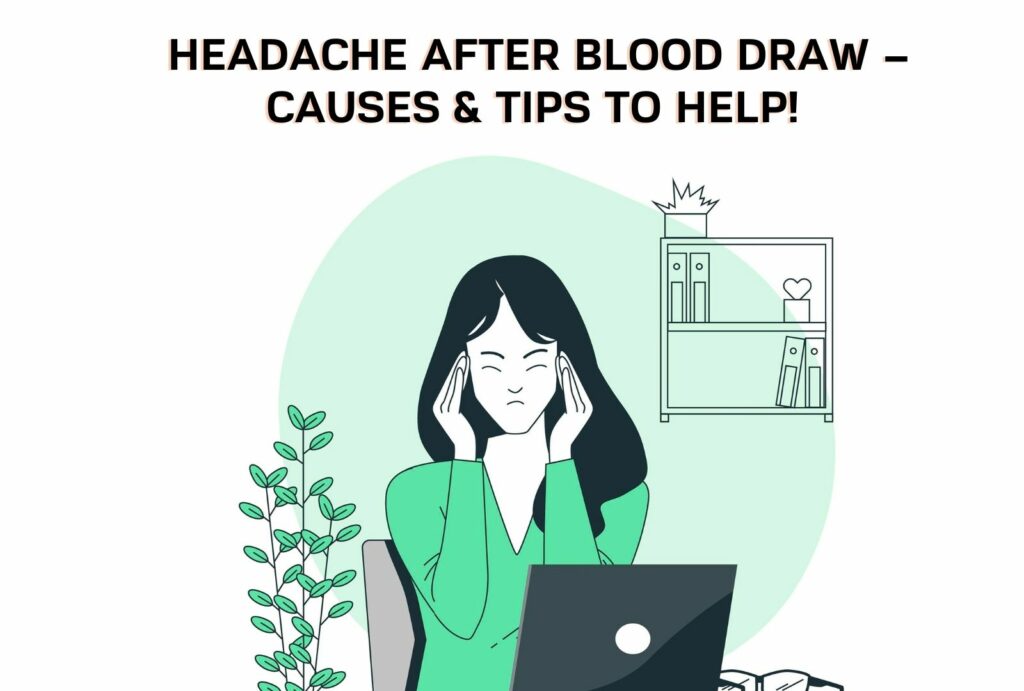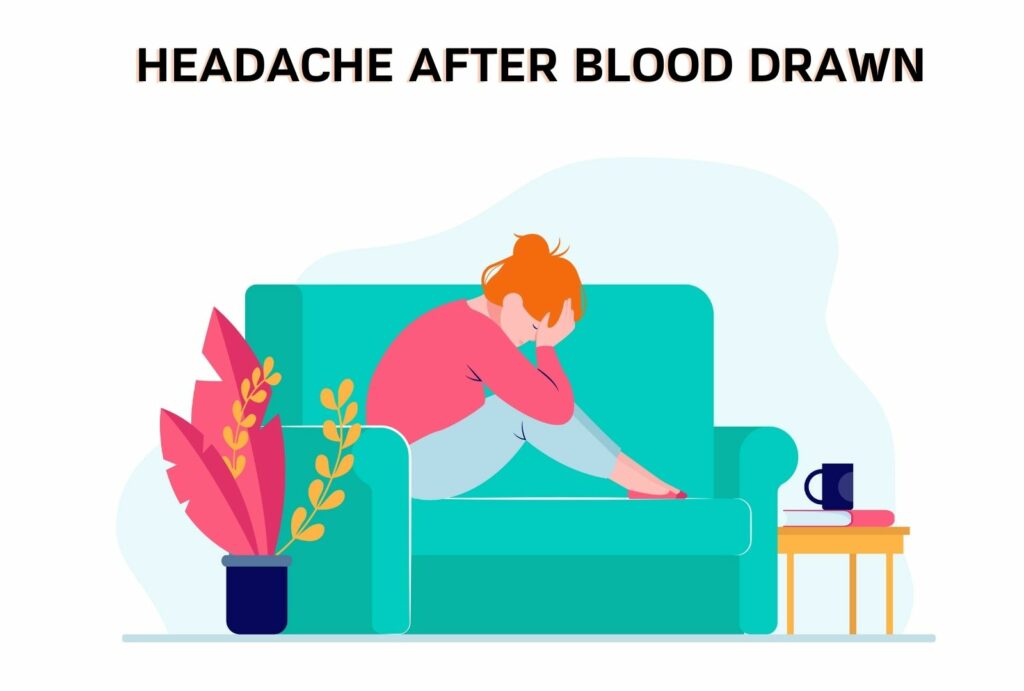
Headaches after a blood draw are a common occurrence that can happen for a variety of reasons. While it is a relatively minor side effect, it can still be uncomfortable and disruptive to your daily life. In this article, we will explore the causes of headache after blood draw and tips to help alleviate the pain.
One of the most common causes of headache after blood draw is dehydration. When you are dehydrated, your blood vessels can constrict, which can lead to a headache. It is important to drink plenty of water before and after a blood draw to prevent dehydration.
Anxiety or stress
Another common cause of headache after blood draw is anxiety or stress. Many people experience anxiety or fear when it comes to needles or medical procedures, which can cause tension and a headache. It is important to take deep breaths and relax during the blood draw to reduce anxiety and prevent a headache.
Sometimes, a headache after a blood draw can be caused by low blood sugar. If you have not eaten before the blood draw or have a medical condition such as diabetes, low blood sugar can cause a headache. It is important to eat a healthy meal before the blood draw and bring a snack with you to eat afterwards if necessary.
There are several tips to help alleviate a headache after a blood draw. First, make sure to drink plenty of water to stay hydrated. You can also apply a cool compress to your forehead or neck to reduce pain and inflammation. Rest and relaxation can also be helpful in reducing headache pain.
In rare cases, a headache after blood draw can be a sign of a more serious condition such as meningitis or a blood clot. If you experience severe headache pain, neck stiffness, fever, or other concerning symptoms, seek medical attention immediately.
In conclusion, headaches after a blood draw are a common occurrence that can be caused by dehydration, anxiety, low blood sugar, or other factors. Taking steps to stay hydrated, reduce anxiety, and eat a healthy meal before the blood draw can help prevent a headache. If you do experience a headache, applying a cool compress and taking time to rest and relax can be helpful. However, if you experience severe headache pain or other concerning symptoms, seek medical attention immediately.
Getting blood drawn

Getting blood drawn is a common medical procedure that involves the removal of blood from a person’s body for diagnostic or therapeutic purposes. This procedure is usually carried out by a healthcare professional who uses a needle to draw blood from a vein in the arm. While getting blood drawn is a routine procedure, some people may experience a headache after blood draw.
For some people, getting blood drawn can be a stressful and anxiety-inducing experience. This can be due to a fear of needles or the anticipation of pain during the procedure. Such individuals may be at a higher risk of experiencing a headache after blood draw. The anxiety and stress associated with the procedure can cause a headache to develop, which may last for several hours or even a day.
- Dehydration – Another possible cause of a headache after blood draw is dehydration. When a person gets their blood drawn, they lose some amount of fluid along with the blood. If they don’t drink enough fluids before and after the procedure, they may become dehydrated, which can trigger a headache. Therefore, it’s important to stay hydrated before and after getting blood drawn.
In some cases, a headache after blood draw can be a side effect of the procedure itself. The act of inserting a needle into a vein can cause a small injury or trauma to the surrounding tissues, leading to pain and inflammation. This can trigger a headache, which may last for a few hours or even a day. However, this type of headache is usually mild and goes away on its own.
If you experience a headache after blood draw, there are several things you can do to manage the pain. Over-the-counter painkillers such as ibuprofen or acetaminophen can help relieve the headache. Applying a cold compress to the forehead or back of the neck may also help alleviate the pain. It’s important to rest and avoid strenuous activities for a few hours after the procedure to allow the body to recover.
In conclusion, getting blood drawn is a routine medical procedure that may cause a headache in some individuals. The headache after blood draw can be caused by stress and anxiety, dehydration, or the procedure itself. However, the headache is usually mild and can be managed with over-the-counter painkillers, rest, and hydration. If you experience severe or persistent headaches after getting blood drawn, it’s best to consult your healthcare provider.
Vasovagal reaction
Vasovagal reaction is a common medical condition that can occur during certain medical procedures, including blood draws. It is a reflex response of the body that causes a sudden drop in blood pressure and heart rate, leading to symptoms such as dizziness, nausea, sweating, and fainting. Vasovagal reaction can also cause a headache after blood draw in some individuals.
During a vasovagal reaction, the body’s nervous system responds to a trigger, such as the sight of blood or the stress of a medical procedure, by releasing certain chemicals that cause the blood vessels to dilate and the heart rate to slow down. This results in a sudden drop in blood pressure and a decrease in the amount of oxygen-rich blood flowing to the brain, leading to symptoms such as dizziness and fainting.
In some individuals, a headache after blood draw can be a symptom of a vasovagal reaction. The sudden drop in blood pressure and the decrease in blood flow to the brain can cause a headache to develop, which may last for several hours or even a day. However, this type of headache is usually mild and goes away on its own.
If you experience a vasovagal reaction during a blood draw, there are several things you can do to prevent or manage the symptoms. One way is to lie down or sit with your head between your knees, which can help increase blood flow to the brain and alleviate symptoms such as dizziness and fainting. Drinking water or other fluids before and after the procedure can also help prevent dehydration, which can trigger a vasovagal reaction.
It’s also important to let the healthcare provider know if you have a history of vasovagal reactions or if you feel anxious or stressed during the procedure. The healthcare provider can take steps to minimize the risk of a reaction, such as using a smaller needle or providing distraction techniques to help you relax.
In rare cases, a vasovagal reaction during a blood draw can lead to more serious complications, such as injury from a fall or a seizure. If you experience severe or persistent symptoms such as chest pain, shortness of breath, or loss of consciousness, seek medical attention immediately.
In conclusion, a vasovagal reaction can occur during a blood draw and can cause symptoms such as dizziness, nausea, sweating, and fainting. In some individuals, a headache after blood draw can also be a symptom of a vasovagal reaction. However, this type of headache is usually mild and goes away on its own. If you experience a vasovagal reaction during a blood draw, there are several things you can do to prevent or manage the symptoms, such as lying down or sitting with your head between your knees and letting the healthcare provider know if you have a history of reactions or feel anxious or stressed during the procedure.
Headache after blood drawn
Getting blood drawn is a routine medical procedure that involves the insertion of a needle into a vein to draw blood for diagnostic or therapeutic purposes. While the procedure is usually painless, some people may experience discomfort or pain during or after the procedure. One of the most common side effects of getting blood drawn is a headache after blood draw.
A headache after blood draw can be caused by several factors.
Dehydration
One of the most common causes is dehydration. When a person gets their blood drawn, they lose some amount of fluid along with the blood. If they don’t drink enough fluids before and after the procedure, they may become dehydrated, which can trigger a headache.
Stress and anxiety
Another possible cause of a headache after blood draw is stress and anxiety. Some people may feel anxious or stressed about the procedure, especially if they have a fear of needles or are getting blood drawn for the first time. This can cause tension and trigger a headache, which may last for several hours or even a day.
In some cases, a headache after blood draw can be a side effect of the procedure itself. The act of inserting a needle into a vein can cause a small injury or trauma to the surrounding tissues, leading to pain and inflammation. This can trigger a headache, which may last for a few hours or even a day. However, this type of headache is usually mild and goes away on its own.
If you experience a headache after blood draw, there are several things you can do to manage the pain. Over-the-counter painkillers such as ibuprofen or acetaminophen can help relieve the headache. Applying a cold compress to the forehead or back of the neck may also help alleviate the pain. It’s important to rest and avoid strenuous activities for a few hours after the procedure to allow the body to recover.
In rare cases, a headache after blood draw can be a sign of a more serious condition, such as an infection or bleeding in the brain. If the headache is severe, persistent, or accompanied by other symptoms such as nausea, vomiting, or fever, it’s important to seek medical attention immediately.
In conclusion, a headache after blood draw is a common side effect of getting blood drawn. It can be caused by dehydration, stress and anxiety, or the procedure itself. However, the headache is usually mild and can be managed with over-the-counter painkillers, rest, and hydration. If you experience severe or persistent headaches after getting blood drawn, it’s best to consult your healthcare provider.
How to make the headache go away?

A headache after blood draw can be an uncomfortable and sometimes debilitating experience. Whether the headache is caused by dehydration, stress, or the procedure itself, there are several steps you can take to make the headache go away.
- Stay hydrated – One of the most effective ways to alleviate a headache after blood draw is to stay hydrated. Drinking plenty of water and other fluids before and after the procedure can help prevent dehydration, which can trigger a headache. Avoiding caffeinated and alcoholic beverages can also help, as they can cause dehydration and worsen the headache.
- Over-the-counter pain medications such as ibuprofen or acetaminophen can also be effective in relieving a headache after blood draw. These medications work by reducing inflammation and blocking pain signals in the brain. However, it’s important to follow the recommended dosage and not exceed the maximum daily dose.
- Resting and taking it easy for a few hours after the procedure can also help alleviate the headache. Avoiding strenuous physical activity or anything that can cause strain or tension can help the body recover and reduce the headache.
- Applying a cold compress to the forehead or back of the neck can also help relieve a headache after blood draw. The cold temperature can help reduce inflammation and numb the pain receptors in the brain. It’s important to avoid applying the cold compress directly to the skin and to limit the application to 15-20 minutes at a time.
If the headache persists or is severe, it’s important to seek medical attention. In rare cases, a headache after blood draw can be a sign of a more serious condition, such as bleeding in the brain or an infection. A healthcare provider can perform a physical exam and order tests to determine the cause of the headache and provide appropriate treatment.
In conclusion, a headache after blood draw can be managed with simple steps such as staying hydrated, taking over-the-counter pain medications, resting, applying a cold compress, and seeking medical attention if necessary. It’s important to listen to your body and avoid any activities that can worsen the headache. With proper care and attention, the headache should go away within a few hours or a day.
Other tips to follow
A headache after blood draw can be a common occurrence, but there are other tips and strategies that you can follow to help alleviate the discomfort and prevent it from occurring in the first place.
- One of the simplest tips is to relax and breathe deeply during the blood draw. Many people experience stress and anxiety during the procedure, which can cause tension in the muscles and trigger a headache. Taking slow, deep breaths and focusing on relaxing the body can help reduce stress and tension, making the procedure more comfortable.
- Another tip is to eat a healthy meal before the blood draw. Low blood sugar levels can cause headaches, so it’s important to eat a balanced meal that includes complex carbohydrates, protein, and healthy fats. Avoiding sugary or processed foods can also help prevent spikes and crashes in blood sugar levels.
- If you have a fear of needles or experience anxiety during medical procedures, it may be helpful to talk to your healthcare provider about strategies for managing anxiety. This may include techniques such as meditation, deep breathing, or cognitive-behavioral therapy.
- Staying active and getting regular exercise can also help prevent headaches after blood draw. Exercise helps improve blood flow and circulation, which can reduce the risk of inflammation and pain. However, it’s important to avoid strenuous exercise for at least 24 hours after the procedure to allow the body to recover.
If you experience frequent headaches after blood draw or have a history of migraines, it may be helpful to consult with a healthcare provider about preventive medications or strategies. Some medications can help prevent migraines or reduce the severity of headaches, while other strategies such as acupuncture or massage therapy can also be effective.
In conclusion, there are several tips and strategies that you can follow to help prevent and alleviate headaches after blood draw. These include relaxing and breathing deeply during the procedure, eating a healthy meal before the draw, managing anxiety, staying active, and seeking medical advice for preventive measures. By taking care of your body and mind before and after the procedure, you can help minimize the risk of headaches and promote overall health and well-being.
Frequently Asked Questions (FAQs)
Many people have questions about headaches after blood draw, as it can be a common experience. Here are some frequently asked questions (FAQs) and their answers to help provide more information.
- Q: Why do I get a headache after blood draw?
A: There can be several reasons why someone may experience a headache after blood draw. Dehydration, stress, and low blood sugar levels can all contribute to headaches. In some cases, the procedure itself may cause tension in the muscles or trigger a vasovagal reaction, which can result in a headache.
- Q: How long does a headache after blood draw usually last?
A: The duration of a headache after blood draw can vary depending on the cause and severity. In most cases, the headache should go away within a few hours to a day. If the headache persists or is severe, it’s important to seek medical attention to rule out any underlying conditions.
- Q: Can I take pain medications for a headache after blood draw?
A: Yes, over-the-counter pain medications such as ibuprofen or acetaminophen can be effective in relieving a headache after blood draw. However, it’s important to follow the recommended dosage and not exceed the maximum daily dose.
- Q: Is it normal to feel anxious or stressed during blood draw?
A: Yes, it’s common for people to experience anxiety or stress during medical procedures, including blood draw. It’s important to communicate any concerns or fears with your healthcare provider, who can provide support and strategies for managing anxiety.
- Q: Can I prevent headaches after blood draw?
A: Yes, there are several strategies that can help prevent headaches after blood draw. These include staying hydrated, eating a healthy meal before the procedure, managing anxiety, staying active, and seeking medical advice for preventive measures.
- Q: When should I seek medical attention for a headache after blood draw?
A: If the headache is severe, persists for more than a day, or is accompanied by other symptoms such as fever, dizziness, or confusion, it’s important to seek medical attention. These symptoms may be a sign of a more serious condition that requires immediate treatment.
In conclusion, headaches after blood draw can be a common experience, but there are ways to prevent and alleviate the discomfort. If you have any concerns or questions about headaches after blood draw, it’s important to communicate with your healthcare provider, who can provide personalized advice and support.